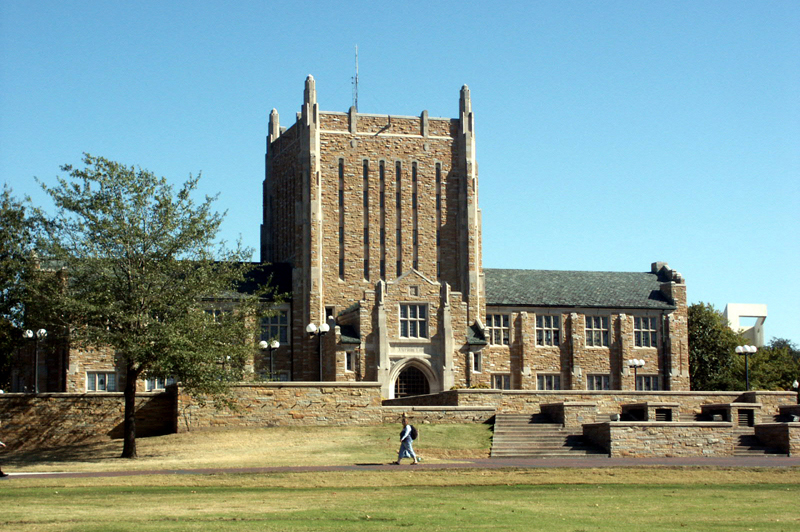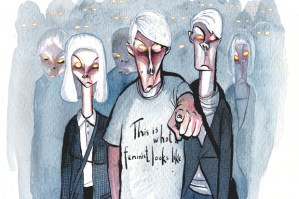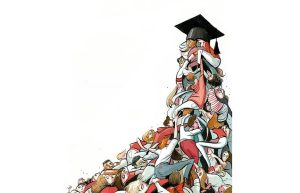Last year Peter Thiel argued that American universities were as corrupt as the Catholic Church was 500 years ago. Thiel, stretching the analogy somewhat, suggested that bloated legions of college administrators are like the layabout priests of the old Church. The practice of paying indulgences was analogous to the runaway tuition fees of today.
Reform is the only route to salvation, he wrote: ‘We need a sort of reformation. I’ve often described the universities as the atheist church. It’s not going to reform itself from within. The reformation will come from without.’
In the past few days it has become clear what this reform looks like when it comes from within. Though it has a $1.1 billion endowment, the University of Tulsa has been running a structural deficit of about $16 million for a number of years now. Faculty pay has been in a deep freeze since 2015 and there have been numerous layoffs and restructurings since.
Then there was the appearance of an ominous document called the ‘Strategic Plan 2017 -2022’. It’s ominous because, although it promised that the strong liberal arts core of the university would be protected, the plan, the text commits more to the topics of ‘innovation’ and ‘justice’ than it does to the humanities. It reads like it was written by a team of McKinsey analysts under the direction of Ta-Nehisi Coates.
A campus ‘Culture of Justice’ will ‘seek out complex problems and injustices in our society, and engage in work that promotes justice.’ Tulsa now has an anonymous online bias reporting system and mandatory ‘unconscious bias’ training for all employees. This is what promoting a ‘culture of justice’ actually means: not the righting of present wrongs, but a system that encourages harassment and endless suspicion.
The administration’s full plan of consolidations and cuts was revealed on April 11. All programs will be combined into four divisions: ‘Ecology, Environment & Sustainability’, ‘Human Biology & Behavior’, ‘Fine Arts & Media’ and (of course) ‘Humanities & Social Justice’. So-called ‘growth areas’ included programs in computer science, digital media, cybersecurity, accounting, petroleum engineering and finance. Majors in religion and philosophy were abolished. Masters and Ph.D. programs in history, physics, chemistry and art will be ‘wound down’.
The bottom line here is the bottom line – TU will support subjects that (probably) lead to jobs, and diminish those that exist for their own sake as a recherché waste of time. One questions whether or not this utilitarian quest for employability is antithetical to the actual task of a university, which is educating its students.
The full story of TU’s radical overhaul involves ‘emotional support animals’ being herded into classrooms after the election of Donald Trump and the splicing of academic programs with corporate interests until very little that has to do with the liberal arts remains. Jacob Howland, the McFarlin Professor of Philosophy at TU, summed it all up:
‘We have experienced what one could call a hostile takeover that appears to have made TU a subsidiary of Tulsa’s biggest charitable foundation and an agent of the city’s corporate interests. Our infantilized and indoctrinated students will receive but a light wash of liberal arts before they are popped from the higher-education oven. They will perhaps be credentialed, but they will not be educated.’
It reminds me of Margaret Atwood’s dystopian fiction: not The Handmaid’s Tale, that dour little book that ends with an unsatisfying academic in-joke of a last chapter, something I imagine millions of readers secretly didn’t get but were just too scared of looking dumb to say so. The Handmaid’s Tale is essentially The Turner Diaries for people who think that Mike Pence is secretly plotting to take over American wombs. No, the Atwood I mean is from 2004 and is called Oryx and Crake. She turns the dial up on a few ripped from the headlines issues – biotechnology, terrorism, corporate power, inequality, climate change – and creates a plausible, frightening near-future setting. We follow Jimmy and his friend Crake through childhood and adolescence until they go to university. Jimmy is good with words, Crake a genius with numbers.
The latter cruises into the Watson-Crick Institute, which ‘was like going to Harvard had been, back before it got drowned.’ Here students have palatial air-conditioned suites with a maid service. Everything is clean and expensive. They develop game-changing products directly for corporations and receive half the royalties for anything they invent at the Institute.
Jimmy scrapes into the Martha Graham Academy, founded by ‘a clutch of now dead liberal bleeding hearts from Old New York.’ Everything here is dirty and cheap. Although the focus is on Liberal Arts, the emphasis within each subject is utilitarian. By studying ‘Webgame Dynamics’, ‘Image Presentation’ or ‘Pictorial and Plastic Arts’ students can still ‘go into advertising, no sweat.’ In Atwood’s future philosophy, history and literature are a shoddy and threadbare territory, ‘like studying Latin or book-binding… no longer central to anything’ at a time when the arts have been winnowed away into ‘the singalong or the tomato bombardment or the wet t-shirt contest.’
In Oryx and Crake the barbarians who erode the academy and the arts into propaganda are straightforward market fundamentalists. Neoliberal types who enjoy putting down rebellious populations in the global south with private armies. Atwood’s future contains Leftists but they have no power; they’ve lost all the arguments, they’re marginal, they’re outcasts.
What she was unable to anticipate in 2004 – and what we have seen at the University of Tulsa, and at many of the biggest companies in America – is how political correctness and corporate power are not antagonists. They’re best friends.
At least conservatives can pat themselves on the back. They’re sending out exactly the right people to bat for civilization…
https://twitter.com/benshapiro/status/1105852665714499584


















